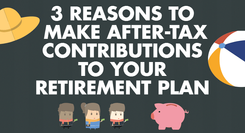Related Posts
Employers and Organizations
Why Payday Advances and Financial Wellness Do Not Go Hand-in-Hand
Last Update: October 31, 2022
According to a recent study1, 73 percent of American adults regularly experience financial stress. These worries include:
- Not having enough emergency savings
- Insufficient retirement savings
- Inability to pay bills
- Paying down debt
Financially stressed employees are less productive at work. Nearly half of employees struggling with finances spend three hours or more at work each week dealing with personal financial matters2.
Employees have begun looking to their employers for help gaining financial health, and employers are stepping up.
However, despite having the employees’ interests in mind, not all financial solutions create the financial health employees seek. In particular, payday advances have the potential to continue the financial stress cycle.
What Are Payday Advances?
Some employers offer payday advances so that their employees have access to their paychecks ahead of schedule.
The idea is that employees feel financial stress due to poor timing. In other words, their bills are due before the money they’ve earned hits their bank account.
When employers offer payday advances, the goal is to help employees:
- Pay their bills on time
- Reduce late fees
- Avoid high-interest payday loans
Unfortunately, the upsides to payday advances do not outweigh the downsides.
Debt Never Equals Financial Wellness
Although having access to money earlier can be helpful, offering payday advances only keeps the debt cycle going.
Yes, employees get access to their money sooner, but not without having to pay a fee to do so. The fee is significantly less than the fees for payday loans, but the advance still costs money that could be better used in other ways.
If your employees could wait for their funds, they would have access to more money that could be used to meet financial goals such as saving for retirement rather than paying for an advance.
Additionally, borrowing money to get out of money problems is not a sound financial principle. Even if the employee intends to pay back the advance quickly, using an advance is not substantially different than pulling out a credit card.
Employers are unlikely to suggest that an employee use a credit card to pay their day-to-day bills, so why should an employer suggest a payday advance?
On the surface, employees may seem to have a timing issue, but upon closer examination, the real issue is poor money management often caused by poor financial literacy.
By offering payday advances, employers are inadvertently helping their employees continue poor habits.
Why budget or save if they can easily get a payday advance?
Behavior Change is Key
Financial wellness means having the knowledge, ability, and desire to make intelligent financial decisions, as well as having the capacity to live a happy life within one's means.
The key to achieving financial wellness, according to a 2017 Aon Hewitt report3, is understanding financial concepts and creating appropriate financial habits. Providing payday advances for employees does neither.
The best financial wellness programs focus on behavioral change4 by focusing on:
- Social cognitive theory: Change occurs through social interaction.
- Positive psychology: Change occurs when people feel good about themselves and their future.
- Stages of change: Change occurs in small steps.
- Gamification: Financial situations are presented as games so that change can be fun.
The Enrich Financial Wellness program uses behavioral change psychology to help employees change financial behaviors, and internal data shows that it works.
One primary user found that after one year, more employees increased their savings, contributed to their retirement plan, and paid off their credit cards each month5. As employees learn and practice these new skills, their financial stress decreases6.
Employers are right to seek solutions that help reduce their employees’ stress. However, rather than consider payday advances, employers should offer a holistic financial wellness program that provides verifiable results.
Download full report on Enrich's Financial Wellness Behavior Change Study
1 - https://www.cnbc.com/select/73-percent-of-americans-rank-finances-as-the-number-one-stress-in-life/
2 - https://www.theexperience.work/wp-content/uploads/2018/06/pwc-2019-employee-wellness-survey.pdf
3 - https://www.hrdive.com/news/successful-financial-wellness-programs-require-behavioral-changes-not-just/511929/
4 - https://russellinvestments.com/us/insights/articles/wellness-is-wellness
5 - https://www.enrich.org/financial-wellness-resources/financial-wellness-behavior-change-data-study
6 - https://www.enrich.org/financial-wellness-resources/financial-wellness-behavior-change-data-study
Featured Posts

Employers and Organizations
3 MIN
10 Simple Ways Benefits Managers Can Recession-Proof Their Employee Benefits Package

Employers and Organizations
3 MIN
3 Reasons to Make After-Tax Contributions to Your Retirement Plan

Employers and Organizations
4 MIN
Financial Information vs Employee Behavior Change: Which Is More Important for Your Company’s Financial Wellness Program?

Employers and Organizations
3 MIN
Does Your Employee Financial Wellness Program Take Mindset Into Consideration?
Related Posts

Employers and Organizations
3 MIN
Is Financial Wellness a Must-Have Employee Benefit?

Enrich News
2 MIN
How Financial Wellness Affects Employee Health

Employers and Organizations
3 MIN
3 Steps Employers Must Take to Create a Culture of Financial Wellness in the Workplace
